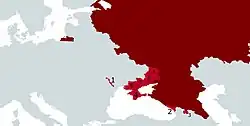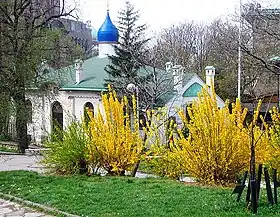Russophilia (literally love of Russia or Russians) is admiration and fondness of Russia (including the era of the Soviet Union and/or the Russian Empire), Russian history, and Russian culture. The antonym is Russophobia.[1][2] In the 19th century, Russophilia was often linked to variants of pan-Slavism, since the Russian Empire and autonomous Serbia were the only two Slavic sovereign states during and after the Springtime of Nations.
By country


Finland
The Communist movement in Finland during the Cold War inclined towards pro-Soviet tendencies, of which the Taistoist movement was especially pro-Soviet.[3][4]
The Finnish political party Power Belongs to the People (VKK) is unique in its strong support of Russia, being the only pro-Russian party in Finland as of 2022. It protested against sanctions on Russia and supported the 2022 invasion of Ukraine.[5][6] The Finnish political activist Johan Bäckman is known for his pro-Russian views and he has recruited Finns to fight for Russia in the war with Ukraine.[7] Bäckman later joined the VKK, led by Ano Turtiainen.[8] Some members of the Finns Party also held pro-Russian views.[9]
Germany
German philosopher Friedrich Nietzsche described Russia as "the only power that has durability in it, which can wait, which can still produce something... the antithesis of that pitiable European petty-state politics and nervousness, with which the foundation of the German Reich has entered its crucial phase..." in his 1895 book The Antichrist[10]
Indonesia
Support for Russia remains high among Indonesians, owing to Moscow's perceived ties to Muslims and the Muslim world. Public animosity towards the West has resulted from the wars waged in Afghanistan and Iraq by the US and its allies, and their perceived neglectful treatment of the Palestinians in the territories occupied by Israel.
Some Indonesians have positively compared support for Russian president Vladimir Putin in the Russo-Ukrainian War to support for former president Suharto in the Indonesian invasion of East Timor.[11] Russophiles are also found among the political left, who support Russia due to inaugural Indonesian president Sukarno's closeness to the Soviet Union. Pro-Russian sentiment is especially strong among members of the governing Indonesian Democratic Party of Struggle, led by Sukarno's daughter Megawati Sukarnoputri, who publicly criticized Ukraine and president Volodymyr Zelenskyy.[12]
Iran
According to a December 2018 survey by IranPoll, 63.8% of Iranians have a favorable view of Russia.[13]
Serbia
Russia is popular in Serbia, and many Serbs have traditionally seen Russia as a close ally due to shared Slavic heritage, culture, and the Orthodox faith.[14] According to the European Council on Foreign Relations, 54% of Serbians see Russia as an ally. In comparison, 11% see the European Union as an ally, and only 6% see the United States in the same manner.[15]
During the 2022 Russian invasion of Ukraine, People's Patrol, a far-right group, organized pro-Russian rallies in Belgrade, which were attended by 4,000 people.[16][17][18]
In 2017, the inhabitants of the Serbian village of Adžinci renamed their village Putinovo, in honor of Vladimir Putin.[19][20]


 Russian Orthodox Church in Tašmajdan park, Belgrade
Russian Orthodox Church in Tašmajdan park, Belgrade Vladimir Putin at Belgrade's Red Star Stadium in March 2011
Vladimir Putin at Belgrade's Red Star Stadium in March 2011 Vladimir Putin in front of Cathedral of Saint Sava
Vladimir Putin in front of Cathedral of Saint Sava "Z" symbol in support of Russia's war against Ukraine with an inscription "Russians and Serbs brothers forever"
"Z" symbol in support of Russia's war against Ukraine with an inscription "Russians and Serbs brothers forever"
Ukraine
Following Ukrainian independence in 1991, in the 1991 Ukrainian independence referendum 92% (including 55% of ethnic Russians) voted for independence from Moscow,[21] but some Ukrainians, mostly in the east and south of the country, voted to see a more Russophile attitude of the government, ranging from closer economic partnership to full national union.[22] Russia and Ukraine had especially close economic ties, and the Russophilic political party, the Party of Regions, became the largest party in the Verkhovna Rada in the 2006 Ukrainian parliamentary election, receiving 33% of the votes. It would remain a dominant force in Ukrainian politics, until the 2014 Revolution of Dignity. Following the 2014 Russian military intervention in Ukraine, the overall attitude of Ukrainians towards Russia and Russians has become much more negative,[23] with most Ukrainians favoring NATO[24] and European Union membership.[25]
A survey by the Kyiv International Institute of Sociology in 2016 found that 67% of Ukrainians had a positive attitude to Russians, but that only 8% had a positive attitude to the Russian government.[26]
41% of Ukrainians had a "good" attitude towards Russians (42% negatively), while in general 54% of Russians had a positive attitude towards Ukraine, according to an October 2021 poll of the country's population.[27]
United States
According to the Marly Rusoff Literary Agency, American author Robert Alexander wrote: "I love Russians for their dramatic, emotional nature. They're not afraid to love, not afraid to get hurt, not afraid to exaggerate or act impulsively."[28]
Many members of the Republican Party in the US express positive views on Russia. A 2017 poll highlighted that around 32% of respondents had favorable views of Russian president Vladimir Putin.[29] Following the Russian invasion of Ukraine, these numbers surged. A YouGov poll found nearly 62% of Republicans preferred Vladimir Putin over Joe Biden, noting that the former was a stronger leader than the latter.[30] Many notable Republicans, including former President Donald Trump, television presenter Tucker Carlson, and incumbent Georgia Representative Marjorie Taylor Greene have all expressed admiration for Russia and its leaders.[31][32]
Vietnam
Favorable perceptions of Russia in Vietnam have 83% of Vietnamese people viewing Russia's influence positively in 2017.[33] This stems from historic Soviet support of Vietnam during the Vietnam War.[34]
See also
References
- ↑ "Russophobia". The American Heritage Dictionary. Retrieved 27 December 2020.
- ↑ "Russophobia". Merriam-Webster. Retrieved 10 July 2022.
- ↑ ""Eteenpäin O.W. Kuusisen viitoittamaa tietä" – Taistolaiset" (in Finnish). Retrieved 18 March 2023.
- ↑ "Tämä kolahti: Lauri Hokkasen teos on silmiä avaava tilitys siitä, mihin totuudelta silmät sulkeva opillisuus voi johtaa". www.kirkkojakaupunki.fi (in Finnish). Retrieved 18 March 2023.
- ↑ Hiiro, Jukka (25 August 2022). "Seuran kysely: VKK:n kannattajat erottuvat kaikissa Venäjä-kysymyksissä – Venäjä-vastaisimpia ovat Rkp:n ja kokoomuksen kannattajat". Seura.fi (in Finnish). Retrieved 18 March 2023.
- ↑ "VKK:n rivit rakoilevat: Ano Turtiaisen Venäjä-puheet, autoritaarinen johtajuus ja uskonnolliset kannanotot ajavat pois puolueesta". Yle Uutiset (in Finnish). 11 April 2022. Retrieved 18 March 2023.
- ↑ "Itä-Ukrainassa Venäjän puolesta taistelleet suomalaiset kehuskelevat kokemuksillaan – muualla Euroopassa vierastaistelijoita on tuomittu rikoksista". Yle Uutiset (in Finnish). 23 November 2021. Retrieved 18 March 2023.
- ↑ "VKK-puolue yrittää saada dosentti Johan Bäckmanin eduskuntaan". demokraatti.fi (in Finnish). 28 February 2023. Retrieved 18 March 2023.
- ↑ "Osa perussuomalaisista myötäilee suoraan Venäjän kantoja". www.iltalehti.fi (in Finnish). Retrieved 18 March 2023.
- ↑ "Nietzsche, Putin and the spirit of Russia". 27 August 2022.
- ↑ "Dinilai Mirip dengan Soeharto jadi Alasan Warganet Kagumi Putin dan Dukung Invasi Rusia ke Ukraina" [Judging Similar to Suharto is the Reason Netizens Admire Putin and Support Russia's Invasion of Ukraine]. Tribun Kaltim (in Indonesian). 19 March 2022.
- ↑ "Megawati Singgung Perang Ukraina-Rusia saat Resmikan KRI Bung Karno".
- ↑ "State of Iran Survey Series". IranPoll. 8 February 2019.
- ↑ "Зашто је Путин толико популаран у Србији? – Центар за развој међународне сарадње". crms.org.rs. Retrieved 17 October 2018.
- ↑ "Pandemic trends: Serbia looks east, Ukraine looks west". ecfr.eu. 5 August 2021. Retrieved 9 November 2021.
- ↑ Filipovic, Branko (5 March 2022). "Pro-Russia Serbs march in Belgrade as country treads ever finer line between East and West". Reuters. Retrieved 7 March 2022.
- ↑ "Thousands of pro-Russia Serbs march in Belgrade". BBC News. Retrieved 7 March 2022.
- ↑ Komarčević, Dušan (14 December 2022). "Pod maskama u Beogradu 'brane' Kosovo". Radio Slobodna Evropa (in Serbo-Croatian). Retrieved 11 January 2023.
- ↑ "Serbian village renamed for Putin would welcome Trump, too". NBC News. 5 February 2017. Retrieved 10 March 2022.
- ↑ Коцић, Данило. "Путиново, село с 12 душа". Politika Online. Retrieved 10 March 2022.
- ↑ The Return: Russia's Journey from Gorbachev to Medvedev by Daniel Treisman, Free Press, 2012, ISBN 1416560726 (page 178)
- ↑ Rapawy, Stephen (1997). Ethnic Reidentification in Ukraine (page 17) (PDF). Washington, D.C.: United States Census Bureau. Archived from the original (PDF) on 19 October 2012. Retrieved 12 July 2018.
- ↑ How Ukraine views Russia and the West, Brookings Institution (18 October 2017)
- ↑ "Pledging reforms by 2020, Ukraine seeks route into NATO". Reuters. 10 July 2017. Retrieved 3 October 2021.
- ↑ Simmons, Katie; Stokes, Bruce; Poushter, Jacob (10 June 2015). "3. Ukrainian Public Opinion: Dissatisfied with Current Conditions, Looking for an End to the Crisis". Pew Research Center's Global Attitudes Project. Retrieved 3 October 2021.
- ↑ "CHANGES IN THE ATTITUDE OF THE POPULATION OF UKRAINE TOWARD RUSSIA AND OF THE POPULATION OF RUSSIAN TOWARD UKRAINE". www.kiis.com.ua/. Retrieved 15 February 2017.
- ↑ "Украинцы хуже относятся к РФ, чем россияне в Украине – опрос". www.kiis.com.ua/ (in Ukrainian). Retrieved 31 October 2021.
- ↑ "Book Group Guide – Rusoff Agency". Rusoffagency.com. Retrieved 17 October 2018.
- ↑ Mann, Windsor. "Republicans' inexplicable surge in Russophilia: Windsor Mann". USA TODAY. Retrieved 19 December 2023.
- ↑ Mahdawi, Arwa (1 March 2022). "Why does Putin have superfans among the US right wing?". The Guardian. ISSN 0261-3077. Retrieved 19 December 2023.
- ↑ "Meet the pro-Putin Republicans and conservatives". Republican Accountability. Retrieved 19 December 2023.
- ↑ Vargas, Ramon Antonio (13 December 2023). "Hakeem Jeffries singles out Republican 'pro-Putin caucus' opposing Ukraine aid". The Guardian. ISSN 0261-3077. Retrieved 19 December 2023.
- ↑ "Vietnam views of Russia". 16 August 2017.
- ↑ "Anti-Western and hyper macho, Putin's appeal in Southeast Asia". Al Jazeera. 18 November 2022. Archived from the original on 19 November 2022. Retrieved 20 November 2022.
- Orest Subtelny. Ukraine. A history. University of Toronto Press. 1994. ISBN 0-8020-0591-8.
External links
![]() Media related to Russophiles at Wikimedia Commons
Media related to Russophiles at Wikimedia Commons
